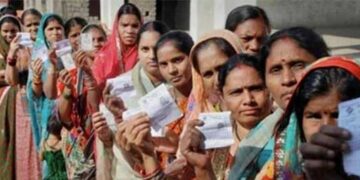Dr Satyabhusan Dash
INDIA’S democratic structure is on the cusp of a significant transformation with the proposed ‘One Nation, One Election’ (ONOE) concept. The idea, advocating for simultaneous elections to the Lok Sabha and state Assemblies, is poised to redefine the electoral framework of one of the world’s largest democracies.
Amid a polarised debate, the ONOE proposal has emerged as a focal point for discussions on electoral efficiency and democratic integrity.
Critics of ONOE voice concerns about its potential to overshadow state issues with national narratives, potentially affecting the federal structure and regional representation.
They argue that aligning state and national elections could lead to a homogenisation of electoral issues, weakening the distinct political identities of states. Furthermore, the logistical and constitutional challenges of implementing such a system are seen as significant hurdles.
Pragmatic considerations
However, the rationale for ONOE is grounded in pragmatic considerations. Advocates highlight the enormous financial savings and administrative ease that simultaneous elections could offer.
India’s current electoral process involves considerable expenditure and resource allocation, repeated multiple times over a five-year period. ONOE promises to consolidate these expenses and efforts, leading to a more resource-efficient electoral process.
Additionally, the proposal addresses the issue of governance disruption due to the frequent imposition of the Model Code of Conduct. ONOE could potentially reduce the duration of this electoral ‘silence period’, allowing for uninterrupted policy implementation and governance.
Comprehensive evaluation
This aspect is particularly crucial for fostering a stable political environment conducive to long-term developmental planning. The high-level committee on ONOE, under the stewardship of former President Ram Nath Kovind, reflects a serious commitment to exploring this proposal. Composed of individuals renowned for their integrity and intellectual prowess, the committee is engaging in a comprehensive evaluation of ONOE. Their approach involves soliciting opinions from a broad spectrum of stakeholders, including political entities, legal experts, and general public. The committee’s deliberations have so far received a strong endorsement from the public, with a significant majority in favour of the ONOE concept.
This public support underscores a collective yearning for electoral reform and efficient governance. The committee’s objective and inclusive methodology in assessing the feasibility of ONOE is indicative of a democratic process in action.
In essence, the ONOE debate is about striking a balance between the operational efficiencies of a unified electoral process and the preservation of India’s diverse democratic fabric. As the committee continues its work, the potential shift towards ONOE is being watched with keen interest.
The committee’s recommendations are expected to shape the trajectory of India’s electoral system, possibly leading to a paradigm shift in the way democracy functions in this vast and diverse nation.
















